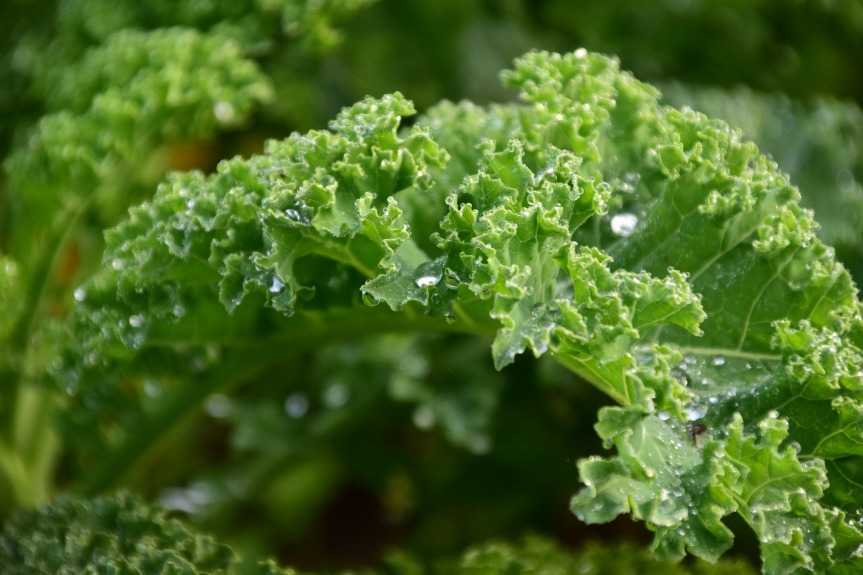
This post is copied from our older, original blog. Original post date 01/09/2013.
By Marcie Bower, Lic.Ac.
If you are into health and nutrition at all, you’ve probably heard about the many nutritional benefits of Kale. But I bet even you don’t know all the reasons why you should be sure you are including this nutritional powerhouse in your diet! Kale is a cruciferous vegetable and a form of cabbage. It is a wonderful source of many vitamins you need. It is very high in beta carotene, vitamin K, vitamin C, lutein, zeaxanthin, and calcium. Read on for specifics about why kale can keep you healthy.
Kale has anti-cancer properties.
Like the other cruciferous vegetables (broccoli, cauliflower, brussel sprouts, cabbage, bok choy), kale is known to be a “cancer-fighting” vegetable. Kale’s anti-cancer properties take a number of different forms. It, like its cruciferous relatives, contain compounds indole-2-carbinol and isothiocyanates. Studies show that these compounds, released when the vegetable is chopped or chewed, have a protective effect against cancer. They seem to interact with estrogen pathways in the body to deactivate tumor-promoting estrogen metabolites and increasing the levels of protective forms of estrogen. Cruciferous vegetables also contain sulforaphane, a compound that increases your liver’s ability to detoxify carcinogenic (cancer-causing) compounds.
Kale reduces oxidative stress to keep you healthier.
Cruciferous vegetables have also been shown to reduce oxidative stress in your body. In a study by the National Cancer Institute, eating 1 to 2 cups of cruciferous vegetables each day resulted in a 22% decrease in oxidative stress. Why is this important? Because oxidative stress has been linked to a whole host of chronic diseases, including cancers, rheumatoid arthritis, and Alzheimer’s disease.
Kale aids in digestion.
1 cup of kale contains 5 grams of fiber (and 36 calories.) The high fiber content of kale makes it an ideal vegetable to keep your intestines working optimally and prevent constipation and sluggish digestion.
Kale is packed with Vitamin K.
Vitamin K is known as the clotting vitamin because without it your blood wouldn’t clot. (For this reason, patients taking Coumadin or other blood thinners need to be very careful of eating foods high in vitamin K, as it can throw off the dosing of the medication quite easily.) It is an absolutely essential vitamin and kale is an excellent source of it. Vitamin K helps the body to transport calcium. Studies have also shown that Vitamin K may reduce bone loss and reduce the risk of bone fractures in the elderly.
It has been shown that a diet high in Vitamin K may protect against certain forms of cancer.
Kale is high in iron (and nourishes the blood).
Per calorie, kale has more iron than beef. Iron is essential to many body functions, including transportation of oxygen through the body, proper cell growth, and healthy liver function. An iron deficiency often causes symptoms such as feeling tired or weak, dizziness, headaches, shortness of breath, pale skin, feeling sad or grumpy, and trouble concentrating.
From a TCM perspective, a weakness in the blood energy of the body often causes the above iron-deficiency symptoms. Kale is a wonderful vegetable to nourish the blood energy, which has a lot to do with our day to day energy and also women’s reproductive cycles. Many of my infertility patients have a blood energy deficiency, and we use acupuncture and herbs to nourish the blood. Kale is an essential food to be included in such a treatment plan. The blood also “roots” the spirit, so many mental-emotional issues have to do with a blood energy weakness.
Kale is an excellent source of calcium.
Per calorie, kale has more calcium than milk. And we all know that we are supposed to drink milk to give us strong bones. Calcium is essential for the development of strong bones and teeth. It also prevents bone loss and osteoporosis. Calcium plays many other roles in the body, too, and a deficiency of calcium has been shown to be linked to high blood pressure, high cholesterol, PMS and menstrual cramps, and hypoparathyroidism.
Kale strengthens the stomach and stops pain, and eases lung congestion.
From a TCM perspective, kale exerts a large energetic effect on the stomach and digestive tract. It works to stop pain and to nourish the body’s own defensive energy in these organs. It also helps in tissue regeneration. This makes kale a good food choice for stomach ulcers. Kale also exerts an effect on the lung energy to reduce congestion in the lungs, making it a good nutritional treatment for mild cough.
So eat up! Enjoy!
http://www.cncahealth.com/health-info/general/veggie-superfoods.htm
http://www.ncbi.nlm.nih.gov/pubmed/16704986?itool=EntrezSystem2.PEntrez.Pubmed.Pubmed_ResultsPanel.Pubmed_RVDocSum&ordinalpos=20
http://www.mindbodygreen.com/0-4408/Top-10-Health-Benefits-of-Eating-Kale.html
http://nutritiondata.self.com/facts/vegetables-and-vegetable-products/2461/2
http://www.whfoods.com/genpage.php?tname=foodspice&dbid=38
http://www.webmd.com/a-to-z-guides/iron-deficiency-anemia-topic-overview
http://www.nlm.nih.gov/medlineplus/ency/article/002407.htm
http://www.drweil.com/drw/u/ART02804/vitamin-k.html
http://www.umm.edu/altmed/articles/calcium-000290.htm
http://www.acupuncture.com/nutrition/kale1.htm
http://www.nlm.nih.gov/medlineplus/ency/article/002400.htm

